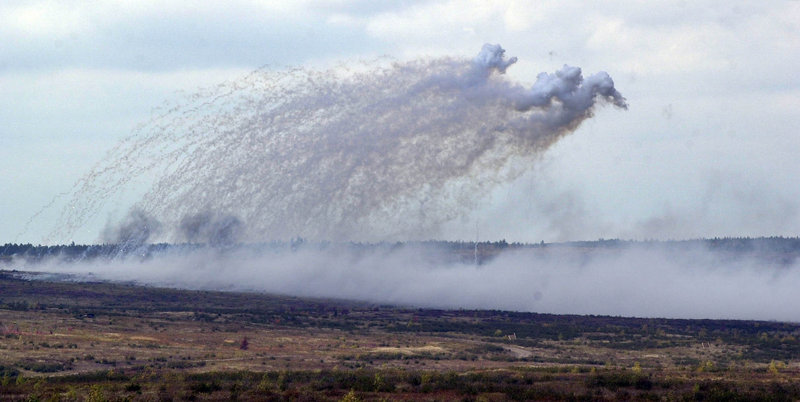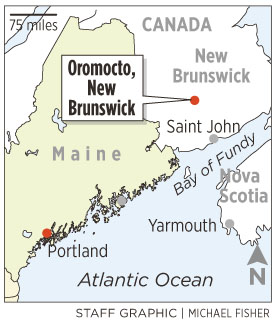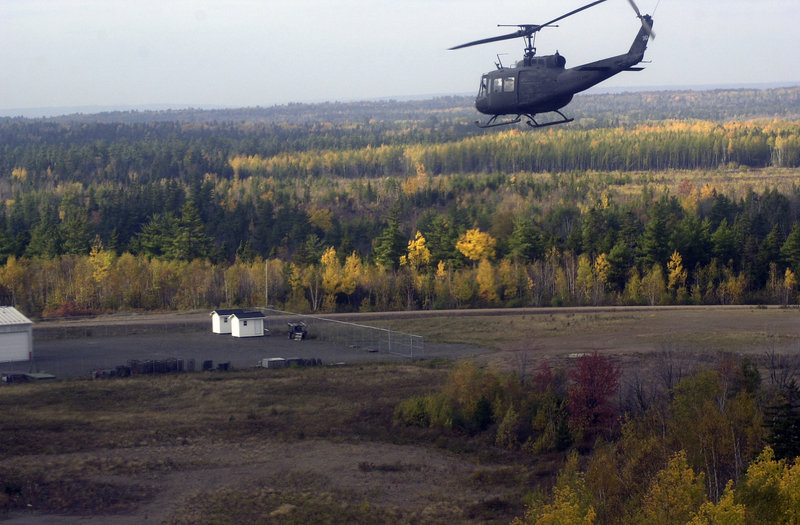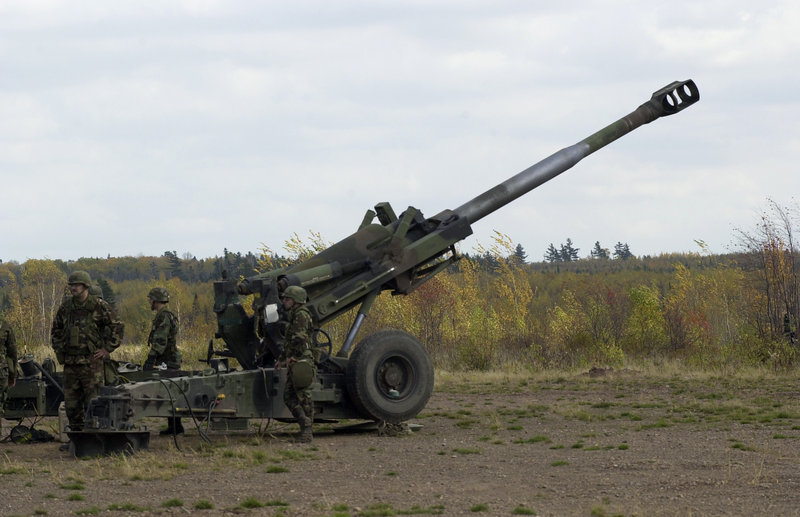WASHINGTON – Two weeks a year for six years, Carroll Jandreau stepped away from life in far northern Maine to dig, crawl and sleep in the dirt of a massive military training base in neighboring Canada.
“When we would go there, they would say, ‘Make sure not to bathe in the pools of water, not to drink the water and not to eat the vegetation,”‘ Jandreau said. “But we couldn’t eat the vegetation because the leaves were all brown and crisp.”
Jandreau, a member of the Maine Army National Guard, would learn decades later why the grass and shrubs covering the training grounds at Canadian Forces Base Gagetown appeared burnt.
From the mid-1950s to the mid-1980s, Canadian officials applied massive quantities of chemical herbicides and defoliants — including a small amount of Agent Orange — to Gagetown’s fields to keep the vegetation at bay.
Now, Jandreau and a growing number of other veterans from Canada and New England suspect the cancers and other diseases they developed later in life may be linked to their time at Gagetown.
“A lot of the guys that went there and a lot of the people I knew died from kidney cancer,” said Jandreau, a Fort Kent resident who has battled renal cancer, diabetes and breathing problems.
To date, the Canadian and U.S. governments have only compensated a relatively small number of people who served in 1966 or 1967, when Agent Orange was sprayed. According to both governments, there is no evidence of health risks to other veterans.
Last week marked another setback for U.S. veterans hoping to receive disability benefits for ailments they blame on Gagetown. The U.S. Centers for Disease Control and Prevention agreed with a 2007 Canadian government study that determined herbicides sprayed at the base posed no public health threat to veterans.
Members of Maine’s congressional delegation responded with cautious dissatisfaction.
Sen. Susan Collins, the Republican who requested the study last year, said she was “disappointed that it does not appear that the thorough investigation the (Obama) administration promised to undertake went beyond a review of the pre-existing Canadian report.” Collins said she had hoped the CDC would talk to veterans and their health care providers.
U.S. Rep. Mike Michaud, D-2nd District, pledged to continue pushing the U.S. Veteran’s Administration “to pursue all possible options,” including establishment of a voluntary “Gagetown registry” to help track and inform veterans.
“Government reports may state there was little to no risk in training at Gagetown, but I know a lot of Maine veterans strongly disagree and some continue to suffer from diseases associated with herbicide exposure,” said Michaud, the top-ranking Democrat on the House Veterans’ Affairs Committee. “While the recent CDC report reviews the soil and the contaminants, there has not been anything that looks specifically at the veterans themselves.”
‘IT’S SCANDALOUS’
Veterans seeking disability benefits face the daunting challenge of proving their lung or prostate cancer, diabetes or other ailments regularly found in the general population are definitively linked to time spent at Gagetown decades ago. Often, a definitive link is elusive.
As a result, Gagetown has spawned class-action lawsuits in Canada, congressional inquiries in the United States and conspiracy theories on both sides of the border accusing military officials of a major cover-up.
“It’s scandalous,” said Gary Goode of Fernie, British Columbia, a Gagetown veteran and lung cancer survivor heavily involved in the debate in Canada. The fight over chemical use at Gagetown is exponentially louder in Canada than in the United States due to the estimated 300,000 Canadian veterans who trained or were stationed at the base.
“I know the Canadian government has said that they did an independent study, but there was nothing independent about it at all,” Goode said of the 2007 study recently evaluated by the CDC.
Located in the town of Oromocto near the provincial capital of Fredericton, Gagetown is the second-largest military base in Canada and the third-largest employer in New Brunswick. Hundreds of thousands of Canadian troops and thousands of Americans spent time at the 250,000-acre base.
Both the Canadian and U.S. governments acknowledge that some veterans who trained at or were stationed at Gagetown were potentially exposed to Agent Orange.
Over a span of seven days in 1966 and 1967, the U.S. military used helicopters to spray several barrels on 166 plots to test the defoliant before deploying it in the jungles of Vietnam. Agent Orange, which contains dioxin, has since been linked to cancer, non-Hodgkins lymphoma, Parkinson’s disease, birth defects in offspring and a host of other health problems.
In response to growing pressure and lawsuits, Canada offered sickened veterans who served on the base at the time or civilians living nearby a $20,000 lump-sum settlement. The small number of U.S. veterans who spent time at Gagetown in 1966-67 and subsequently developed specific health problems are eligible for the same types of coverage or benefits offered to veterans exposed to Agent Orange in Vietnam and Korea.
“There were no Maine National Guard troops at the base during these testing periods,” Meagan Lutz, a spokeswoman for the VA, said in a written response to questions from the Maine Sunday Telegram. “Records do show that commercially available herbicides have been used for weed and brush control at the base.”
Veterans contend that those other herbicides have created a toxic legacy at Gagetown that began years before 1966 and lasted for decades.
Military documents obtained by Goode and other Canadian veterans through Freedom of Information requests show that more than 3 million pounds of other herbicides and defoliants — some chemically similar to Agent Orange — were used at Gagetown during a 30-year period.
Goode said only three dozen of the more than 3,000 Canadian veterans who have applied were granted disability benefits as of his last count. The U.S. Department of Veterans Affairs, or VA, has denied more than 100 claims from Maine, according to Collins’ office.
“So far they have all been denied because they don’t meet the criteria within the law,” Peter Ogden, director of the Maine Bureau of Veterans Services, said in an interview last year. The bureau assists some veterans in the appeals to the VA. “And I know that is frustrating for the veterans.”
Chuck Antworth, who is from the Bangor area, is one of those Maine National Guard veterans who received a denial letter from the VA. He is awaiting news on his appeal but is not optimistic.
A member of the Maine National Guard from 1981 to 1987, Antworth trained at Gagetown every year except one with the 152nd Field Artillery unit. The 49-year-old suffers from kidney failure, diabetes, problems with his prostate and thyroid as well as neuropathy in his arms and legs. And he says others from his unit have faced similar health problems.
Some of those ailments would qualify as “presumptive diseases” for Vietnam vets or any others who can document potential exposure to Agent Orange. Unfortunately, they are also relatively common in the general public.
As a radio operator, Antworth said he was often positioned on the ground right next to the artillery. And every time one of those big guns let loose, the reverberations would kick up a cloud of dust that Antworth is convinced contained the seeds of his illnesses.
“There were never any leaves on any of the trees at all,” Antworth said. “It looked like a forest fire went through there.”
One of the leaders of the 152nd during Antworth’s time, retired Staff Sgt. Hazen Murchison of Castle Hill, also battled prostate cancer, diabetes and neuropathy. But unlike Antworth, he spent 18 months in areas of Vietnam and therefore qualifies for VA disability benefits from potential Agent Orange exposure.
Asked whether he believes Vietnam or Gagetown led to his health problems, Murchison replied: “Myself, I think it’s both.”
Jandreau, the Aroostook County veteran, was told he wasn’t a veteran and therefore does not qualify for VA benefits because he served in the National Guard rather than the “regular Army” and was never sent to Vietnam or other active duty assignments. The entire experience has left him frustrated and angry.
“Being told I’m not a veteran after all those years I spent in the National Guard.” Jandreau said, his voice brimming with bitterness.
DOUBTS AND DENIAL LETTERS
In many ways, Jandreau’s and Antworth’s experiences illustrate not only the challenges facing VA personnel as they review disability claims, but also the frustrations of veterans hoping for assistance as they battle life-threatening diseases.
Prostate cancer, lung cancer, diabetes and less common disorders such as Hodgkin’s and Parkinson’s diseases can be caused by environmental exposure, lifestyle choices, genetics and a host of other factors both known and unknown.
So unless a veteran suffers from a rare form of cancer clearly linked to exposure to a specific chemical, there will always be questions about the disease’s cause. And those doubts often result in denial letters.
Under the 2007 Canadian government study recently affirmed by the U.S. Centers for Disease Control, a research team took more than 350 samples of soil, sediment, water and vegetation for testing for lingering chemical contamination.
Although samples taken from the specific areas where Agent Orange was sprayed showed elevated levels, the Canadian report concluded that health risks were low for anyone training in those areas one year after the application. Likewise, the Canadian study predicted no excessive cancer risks for veterans.
“The concentrations of contaminants at CFB Gagetown do not represent a public health hazard now or in the past to members of the U.S. military/National Guard who trained at this Canadian base or to recreational users who access the site now,” the CDC concluded in its report to Collins.
But Richard Pelletier says the proof is in the “clusters” of former National Guard servicemen suffering from similar forms of cancer or other ailments.
A former Maine National Guard member from Madawaska, Pelletier trained at Gagetown but has, to date, not suffered any health problems. He is, however, arguably the most vocal voice in the United States on the Gagetown issue.
For the past seven years, Pelletier has been on a crusade to win VA benefits for veterans in Maine and elsewhere in New England who believe their illnesses could be tied to time spent training at Gagetown. His tenacity and brash style have won him respect from veterans but also caused tensions with those on the other end of his stinging criticisms.
He has accused top officials within the Maine National Guard and the state Department of Defense, Veterans and Emergency Management of siding with the VA rather than veterans on the issue. And he has repeatedly used social media to berate members of Maine’s congressional delegation for what he saw as inaction on the issue.
Although initially pleased that the CDC had agreed to conduct a study, Pelletier was fuming last week after the results were released. He called for an independent review.
“We are continuing to file claims here for people exposed to Agent Orange,” Pelletier said.
BURDEN OF PROOF ON VETERANS
Despite Pelletier’s frustrations with Maine officials, documents show that representatives within the Maine Bureau of Veterans Service and the National Guard were concerned about veterans’ exposure to herbicides and defoliants beyond Agent Orange.
In an April 2006 “information paper” made available to veterans, the office of Maine Bureau of Veterans Services director Ogden acknowledged that veterans were concerned about the “bigger issue” of exposure to 40 different types of herbicides used at Gagetown.
The fact that the other chemicals were registered, legal herbicides does not negate the risk of exposure due to the nature of military training, the paper’s authors wrote.
“Maine National Guard soldiers dug foxholes, low crawled, slept in pup tents, and lived in some of these areas for up to 12 days at a time,” the paper said. “Guard engineers graded roads where herbicides were used to keep brush growth down on the edge of the road; cleared brush out of and constructed bivouac sites; and conducted demolition and engineer missions all over CFB Gagetown. Artillerymen fired thousands of rounds into the impact areas and the detonation of those rounds put those chemicals back into the air to be dispersed wherever the wind took them.”
But an update in September 2007 — one month after the Canadian health risks study was released — merely offers veterans guidance on how to submit claims if they were exposed specifically to Agent Orange while serving outside of Vietnam. There is no reference to other herbicides.
Ogden said the reality is that Congress and the VA set the parameters for reviewing disability claims. And right now those rules state that, with the exception of Agent Orange, veterans who suspect they were exposed to harmful herbicides must prove that connection.
“I have been actively working with the senator’s office and the congressman’s office and the VA to resolve this issue at the state level,” Ogden said last year. “I’m very frustrated with the process, too, because it is so slow to get any resolution.”
NEVER BOTHERED TO APPEAL
Peter Furrow, a Dixmont resident who trained twice with the Guard at the base he remembers as dusty and brown “like a gravel pit,” is among those frustrated with the process.
Furrow had to have a cancerous tumor on his eye surgically removed about three years ago. He also suffers from nerve problems in his hands and feet.
Furrow didn’t give the origins of his cancer much thought until he talked with other Maine veterans riding a VA shuttle bus for treatment in Massachusetts. A handful also battling cancer mentioned their suspicions about Gagetown.
Furrow filed a claim with the VA and, last August, received a response. The VA said it may consider his claim — but first the department needs additional scientific or medical evidence showing a link between his “squamous cell carcinoma” and exposure to dioxins in herbicides. Furrow said last week he never bothered to appeal because he “just knew it was going to be declined.”
“You get tired of trying to fight it,” he said.
Kevin Miller can be contacted at 317-6256 or at:
kmiller@pressherald.com
On Twitter: @KevinMillerDC
Copy the Story Link
Send questions/comments to the editors.







Success. Please wait for the page to reload. If the page does not reload within 5 seconds, please refresh the page.
Enter your email and password to access comments.
Hi, to comment on stories you must . This profile is in addition to your subscription and website login.
Already have a commenting profile? .
Invalid username/password.
Please check your email to confirm and complete your registration.
Only subscribers are eligible to post comments. Please subscribe or login first for digital access. Here’s why.
Use the form below to reset your password. When you've submitted your account email, we will send an email with a reset code.